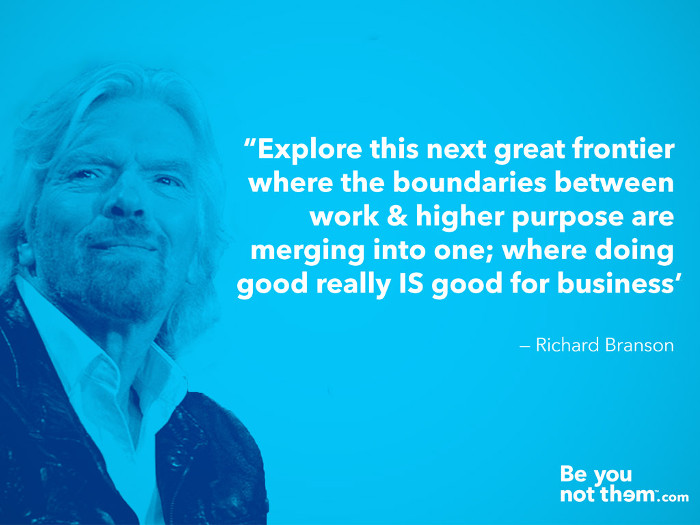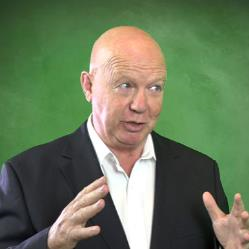"How 'Purpose' amplifies the way we sell" - interview by John Smibert.
 In my last few discussions with Ian Lowe he has convinced me that salespeople who have an authentic purpose (beyond money or recognition) significantly outperform those who don't.
In my last few discussions with Ian Lowe he has convinced me that salespeople who have an authentic purpose (beyond money or recognition) significantly outperform those who don't.
So in this discussion I asked Ian how do we assess if people have a higher purpose that is reflected in how they sell - and if not how can we help them develop it.
Ian spoke about how individuals generally have one of three types of drivers; money, status or purpose. About one third of us fall into each of these categories and research has shown that without doubt the best performers of the three or those driven by purpose.
A key point to recognise is that most of us can shift to a purpose motivator to improve our performance. Ian points out that it is not easy yet we can do it.
Read or view the full discussion below to learn more about how to achieve these positive outcomes that will help you achieve a purpose driven organisation. I recommend it for CEO's, COO's HR, Sales leaders, as well as professional salespeople.
**********
Ian is the CEO of Eccoh.co (formally Go-Givers Australia). He is an expert in sales transformation and a specialist in why people sell.
Subscribe to future videos See previous 'TALKING SALES' videos here
Interview
John: Hey, welcome back all Strategic Selling Group and all my other readers, thank you for joining us again! I've got Ian Lowe with me.
Ian: Hello!
John: Ian, the last few discussion we've had we've talked about purpose and how organisations build a culture of purpose and get their people embraced in that and so on. Let's talk about individuals a little bit. As individuals, I come across a lot of organisations and work with a lot of sales forces and so on, and you do see people with strong purpose that's related to the purpose of the organisation and a really strong intent on the customer, but I find that's almost only one in three or one in four. How do you assess whether people have got a purpose, and what are the sort of things that do drive people other than purpose?
Ian: There's some interesting data coming out of the work that Aaron Hurst and his co-founder Arthur Woods are doing with LinkedIn, a global research study into purpose and the drivers of purpose, and what's emerging is there are three groups of...
John: Three groups of individual?
Ian: Three groups, yes. There are people who are, from a work point of view, more driven by status; it's the position, it's an ego thing, not that that's necessarily a bad thing...
John: And that's what drives a lot of the politics in organisations I guess.
Ian: It can do, it certainly can do. And that's what really lights their fire, that's what work is all about for those individuals. There's another group that are more... It's more a means to an end. Work is about "I've got bills to pay, I've got stuff I need to do. I need to have a job so I can pay my bills and do the stuff I want to do."
John: So work is about getting an income, but for another purpose independent of work.
 Ian: Yes. They might have a purpose that they apply and they follow and they're passionate about outside of work, but work is something that produces the means and the resources they need to follow that purpose. Then there is this other group, this final third, who are purpose-driven people, who see work as being about having an impact, as being intrinsic to them having an impact on the world and influencing change, however they determine that.
Ian: Yes. They might have a purpose that they apply and they follow and they're passionate about outside of work, but work is something that produces the means and the resources they need to follow that purpose. Then there is this other group, this final third, who are purpose-driven people, who see work as being about having an impact, as being intrinsic to them having an impact on the world and influencing change, however they determine that.
John: So they see work as an integral part of their life, an integral part of helping them drive their own purpose.
Ian: Yes, it's central to it. The challenge we face is to try and create more of those people. How do we get more of those other people who are more status oriented or more a means to an end oriented, how do we get more of those people to be purpose oriented?
John: So a person that's driven by status or a person that's driven by income, and haven't got an innate purpose that's aligned to the business that they're working in... How can you change people with that status drive or that income drive to have a purpose? Because I thought that would be an innate thing that's in people.
Ian: Yes. I think we all have a purpose, it's not something that's exclusive to certain people who are in certain types of roles; you don't find more purpose-driven people in the not-for-profit sector for example or in the healthcare sector. Everybody has a purpose that drives them. The challenge is to help organisations to make it okay for people to bring that purpose to work with them, to craft their jobs or design their environment so that their purpose amplifies the effectiveness of what they do.
John: But I'm a little confused here. Somebody driven by status... Isn't that a purpose? "I want to grow my status, I want to really satisfy my ego." That's a purpose, isn't it?
Ian: Yes, it is from a certain point of view.
John: It's a very selfish purpose.
Ian: Yes, it's about "me".
John: So you're talking about purposes that are not about "me", it's going back to the intent discussions we had; it's purpose that's focused on others, focused on customers or whatever.
Ian: Absolutely. I think that's really a key element of purpose, that it is amplified by others.
John: So taking a person that's really driven by status and then trying to change them to be driven by a purpose for others, an intent for others... That sounds like a very difficult change.
Ian: It certainly is, it's challenging. It's going to be something that's going to evolve as we get more research, as we get more data, as we get more skilled and we get more tools, helping to shift those people to being more purpose oriented is going to be easier over time. It's kind of like the same challenge we face when we find disengaged people at work to shift them to be more engaged; it's steps, there are changes, there are things that need to happen.
John: Things like what?
Ian: Things like helping them to, firstly, connect with their purpose and understand what really drives them. The tools are there.
 John: Okay, so understanding themselves better.
John: Okay, so understanding themselves better.
Ian: Yes, understanding yourself better. And then I think a lot of the time in workplaces there's that sort of a cookie-cutter approach, people are directed to do things in certain ways. Especially in sales, where people go through the same sales training, they're taught the same sales skills, they're given the same sales scripts, "Do things this way, follow this thing, ask this question this way." Whereas if you're helping people to connect with their purpose and saying that, "We want you to come to work and be the best you are every single day," people need to do things differently, people need to do things that help them to express themselves.
John: So you're talking about empowering people.
Ian: Empowering people, which, again, challenges the status quo of the typical command and control paradigm of many organisations. So this is why this is going to change over time.
John: I'm hearing between the lines here that the command and control organisations will have a lot of trouble driving a purpose that other people can embrace, if they're being told what to do.
Ian: Exactly right - they contradict each other, right? If you say, "I want you to be empowered and be purpose-driven..."
John: "But follow this process..."
Ian: "But do as I tell you to."
John: "And this is the purpose you're going to have to drive towards, whether you like it or not."
Ian: [laughs] Yes, yes.
John: Okay. So, it really is a major cultural change. Again, it's back to this transformation of organisations, and how we can drive a culture which is purpose-driven, which is empowering of people and so on. That's really what you're saying.
Ian: Absolutely, yes.
John: So back to the one-third, one-third, one-third. A good start is like our earlier discussion, hire the right people with the right engaged purpose...
Ian: Yes, hire people on purpose to start with.
John: But if you've already got them on board where they're driven by status or driven by income, then you need to help them understand themselves better, help them develop a really good understanding of their external purpose, their intent for others, and then embrace and engage that within the corporate purpose.
Ian: Absolutely, yes - you nailed it!
John: Okay. Really interesting subject; massive challenge for a lot of organisations, particularly the old command and control organisations. I'd like to come back, and we'll talk more about from an individual's point of view how can they develop their purpose, independent of the enterprise they're working with. Or within, but develop that as a skill and capability.
Ian: That'd be great, John - talk again soon!
John: Look forward to it, Ian!
****************
More short interviews with Ian Lowe:
**************************

Your Invitation: I invite you to join the Sales Leader Forum group on LinkedIn where you can experience informative discussions with your peers and sales thought leaders on subjects like the one we have discussed here. I also invite you to subscribe to the
- Sales Leader Resource Centre here
- Sales Leader YouTube channel here (300+ sales leadership videos)
Please Share: If you valued this article, please share via your Twitter, LinkedIn, Google+ and Facebook social media platforms. I encourage you to join the conversation or ask questions. So feel free to add a comment on this post - I promise to respond. If inclined please follow my LinkedIn post page here.
Want to touch base? If you have questions please feel free to contact me - email: john.smibert(at)salesleaderforums.com, Phone: +61 404857893 or Skype: john.smibert